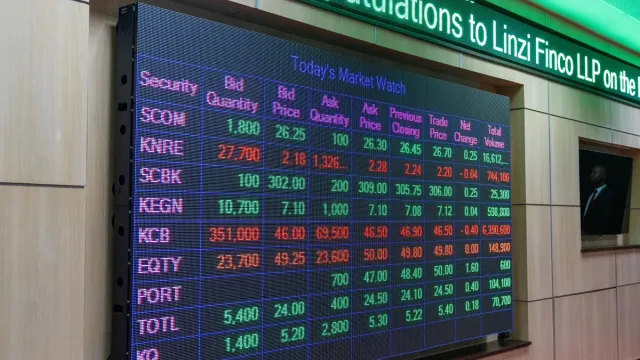NSE greenlights retail trading to shore up investor participation

Currently, NSE statistics show that the participation of retail investors remains at a partly 2.5 percent.
Starting August 8th, the Nairobi Securities Exchange (NSE) will stimulate the bourse by allowing single-unit retail trading of shares, a strategy that aims at increasing the participation of small-scale investors at the bourse.
Currently, NSE statistics show that the participation of retail investors remains at a partly 2.5 percent.
In market update on Tuesday, the NSE explained that this strategy is part of a broad range of initiatives to improve access to investment opportunities for significant number of traders.
"By enabling single-unit trading, the NSE is providing greater flexibility for investors, reducing entry barriers and encouraging wider participation, particularly from retail investors who have previously found it difficult to invest due to high minimum trade sizes," the NSE said.
It added, "the Old Lot Board (previously used for trades below 100 shares) has been removed. All market orders will now be paced and executed on the Main Order Book. Going forward, under Rule 7.6.6, the official daily closing price of a listed equity shall be determined only if the total cumulative traded volume in a session is at least 100 shares or units.
“If the total cumulative traded volume is below 100, the closing price shall remain the previous average reported by the NSE."
The CEO Frank Mwiti noted that single-unit retail trading of shares will help to increase financial inclusion in Kenya while further encouraging the participation of small scale investors. What's more, the strategy helps the NSE to further align with the latest trading practices globally.
This year, the Nairobi bourse has been on an upward trend, with investor wealth posting KES477 billion growth in the first six months to June. This is arguably the highest level reaching by the market since June 2022.
In July, the NSE experienced two major activities with Johannesburg-listed Satrix expanding its offering into another African market by dual listing the Satrix MSCI World ETF, a JSE-listed exchange traded fund (ETF) at the NSE.
The expansion of Satrix offerings into Kenya will contribute significantly to the growth of capital markets in East Africa's largest economy, providing local investors with a diversified array of investment options.
This dual-listed ETF is expected to be pivotal in globalising the NSE and increasing its exposure to international markets.
Just a week ago, the NSE announced a milestone with the listing of a KES44.9 billion infrastructure-backed security whose funds are aimed at financing the construction of Talanta Sports City.
The stadium is one of Kenya's investments that is critical in helping the country host the Africa Cup of Nations competition in 2027.





